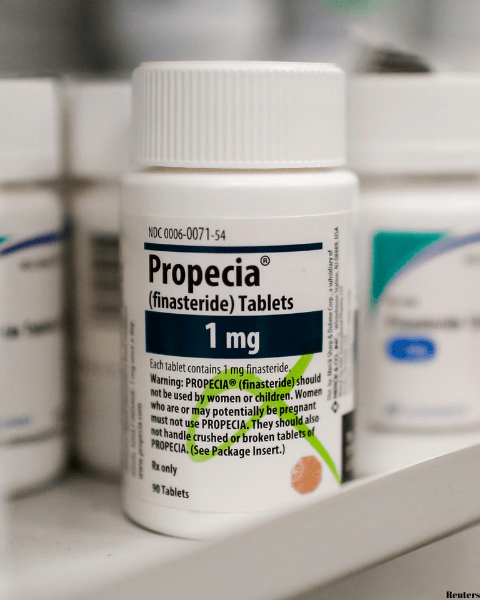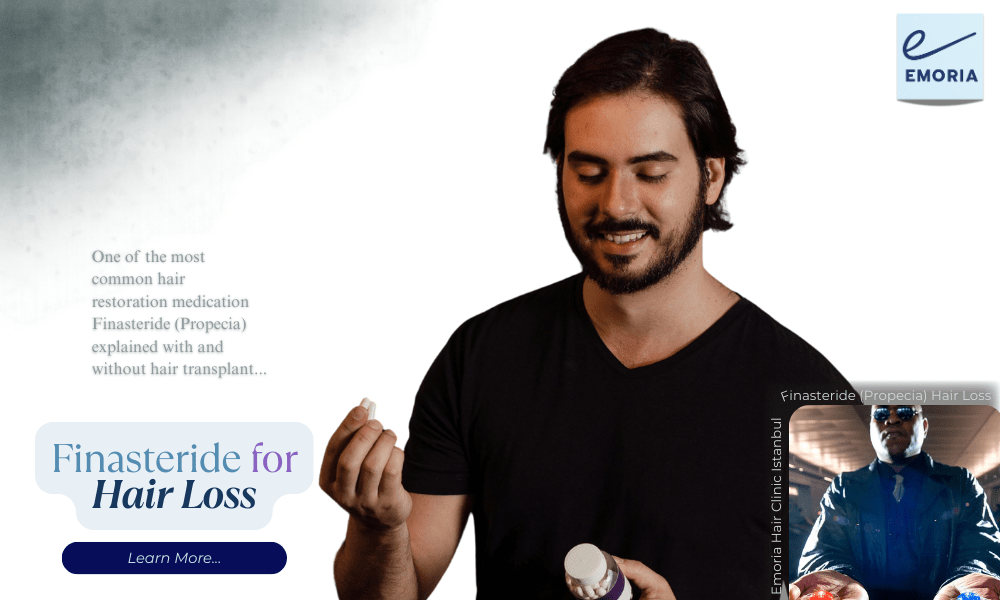Baldness is more than just about appearance — to some men, it’s a constant struggle that destroys their confidence. While hair transplants provide a permanent fix, not all men are prepared to make that commitment. Studies show that about 83% of men using Finasteride either stop losing hair or regrow some within 6 months of daily use. Enter Finasteride, or Propecia, the game-changer in the battle against male pattern baldness. But how does this tiny pill do it? And do you continue to need it after a transplant? In this article, we unmask how Finasteride fights hair loss, when you should use it, and why it is such a key part of optimizing and prolonging your results — especially if you are susceptible to additional hair thinning.
What is Finasteride?
Finasteride is the secret weapon for men fighting back against male pattern baldness. This powerful pill is often sold under the brand name Propecia. Finasteride was originally developed as a treatment for prostate issues but soon was in high demand when its surprising hair-saving capabilities became evident and became an FDA-approved drug for male pattern baldness.
Now, it’s a go-to solution for men who prefer to start the medication journey without immediately jumping into surgical options for treating hair loss. Not a one-time drug, finasteride works best with consistent, long-term use. While it doesn’t regrow hair in everyone, it’s especially effective at slowing down the progression of hair loss and helping men maintain their existing hair.
Finasteride’s tolerable dose — just one pill a day — makes it a perfect choice for most patients. It’s also a milestone of many pre- and post-transplant treatment plans, helping to preserve existing hair and protect the transplant results.
How does Finasteride work for hair loss?
The primary offender in male pattern baldness receives direct attention from Finasteride through Dihydrotestosterone (DHT). The primary factor behind baldness is DHT which attaches to hair follicles of genetically predisposed people thus triggering thinning and weakening of hair until complete baldness occurs.
The 5-alpha reductase type II enzyme inhibitor function of Finasteride blocks the conversion process between testosterone and DHT. The decrease in DHT concentration enables hair follicles to resume their natural functioning and stabilize their growth cycle.
Finasteride has proven to stop hair loss and induce new hair growth in particular treatment situations.
Recommended dosage of Finasteride
The dose recommended for the treatment of baldness with finasteride is 1 mg once a day in the form of a single oral tablet with or without food as directed by your doctor. The medication is still acceptable and on hand to most patients at this dosage.
The treatment cycle involves constant effort because it may take several months (3 -6) to prevent complete baldness and restore hair health.
What Side Effects Could Patients Experience from Finasteride?
Every medication comes with some form of side effects although the severity levels create the main distinction between treatments including Finasteride (Propecia).
The 1 mg dose of Finasteride proves well-tolerable for most men, yet some patients may develop decreased libido, erectile dysfunction, or reduced semen volume. These effects are usually mild and often reversible after medication discontinuation.
Individuals treated with Proscar — the higher-dose version of Finasteride used for prostate conditions — are more exposed to these side effects with higher severity, so it is extremely important to stick to your doctor’s recommended dose.

Should You Take Finasteride Before a Hair Transplant?
Administering finasteride before undergoing a hair transplant surgery is vital to stop further hair loss and hold on to the existing hair. Think of it as protecting your existing soldiers on the battlefield before calling for help with the new soldiers. Finasteride is not only important for the existing hair but also for protecting the newly transplanted hair. Starting finasteride before your surgery maximizes the success of the transplant and ensures a fuller and more natural look for your hair.
Do You Have to Take Finasteride after Hair Transplant?
Taking finasteride after a hair transplant is not just a recommendation, it’s almost essential for ensuring lasting results. While the transplanted hair is permanent, your natural hair continues to be affected by DHT. Without finasteride, the surrounding hair remains at risk, and continued hair loss can occur. Finasteride works to prevent further hair loss and protect your new hairline. Skipping this step could compromise the entire success of your hair transplantation journey.
In short, Finasteride is a frontline defense against male pattern baldness — especially when used early and consistently.
Why Turkey Is the Ultimate Destination for Finasteride Hair Loss Treatment?
Turkey has quickly become a popular destination for those looking to treat hair loss, and for good reason.
It offers world-class medical treatment, very experienced doctors, and great value for money, so it’s a smart choice for anyone seeking Finasteride treatment.
It also has a reputation for being warm and friendly so that you can be assured of a good experience from start to finish. If you’re looking for quality treatment or want to save some extra money while getting rid of hair loss, then Turkey is a great place to have it done.
Cost of Finasteride Treatment for Hair Loss in Turkey
Let’s talk about the price! In Turkey, a monthly supply of Finasteride typically costs around $10–$20, and full transplant packages including medication can start as low as $1,500. Professional treatment is available for a fraction of what it would cost in other countries, so it won’t strain your wallet. In addition, most clinics offer package deals that contain everything in one package deal, so it is even more convenient to deal with both your treatment and your finances. So, if you want to treat your baldness without spending a fortune, Turkey is a destination to consider!

For more detailed information about Finasteride and its significant effect in male androgenic alopecia, you can check the resources below:
References
https://www.ncbi.nlm.nih.gov/books/NBK513329/
https://pubmed.ncbi.nlm.nih.gov/9951956/
https://dermnetnz.org/topics/finasteride
https://www.sciencedirect.com/science/article/pii/S0190962299700812
https://ijdvl.com/guidelines-on-the-use-of-finasteride-in-androgenetic-alopecia/
If you were on Finasteride course for hair loss and you decided to quit the medication suddenly without discussing the condition with your doctor, it will cause a sudden increase in your DHT levels and resume the hair loss.
Finasteride could be dispensed without a prescription in some countries but shouldn’t be administered without medical supervision.
Finasteride is not recommended for female pattern baldness under normal conditions, but it could be prescribed in very rare conditions.

